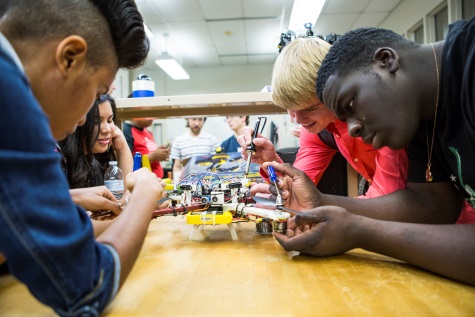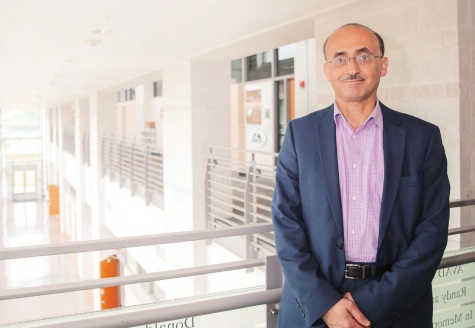Engineering
programs across the nation are undergoing an “epic revitalization” to
keep pace with the rapidly evolving global economy, university
accreditor ABET says in a newly-released brief that details innovations and best practices in the field.
 Capitol
Technology University is among six schools highlighted by ABET in the
document, which explores “effective and flexible engineering programs
that cultivate skilled, confident and career-ready graduates.”
Capitol
Technology University is among six schools highlighted by ABET in the
document, which explores “effective and flexible engineering programs
that cultivate skilled, confident and career-ready graduates.”
The six schools – Capitol, Olin College, Worcester Polytechnic Institute, Rose-Hulman Institute of Technology, Massachusetts Institute of Technology, and Rice University -- offer undergraduate engineering programs that blur the lines between class and career, and increase access to dynamic, hands-on learning opportunities and projects for students, ABET said in the brief, entitled “Engineering Change: Lessons from Leaders on Modernizing Higher Education Engineering Curriculum.”
 “The
delivery of STEM curriculum in the age-old tradition of higher
education is no longer effective for the business needs of today and
tomorrow,” says ABET Executive Director and CEO Michael Milligan. “If we
will meet the current and future demands for dynamic engineering
talent, colleges and universities must rethink the role of engineers in
our society and offer curriculum that prepares them to meet and overcome
the challenges confronting the world today and tomorrow.”
“The
delivery of STEM curriculum in the age-old tradition of higher
education is no longer effective for the business needs of today and
tomorrow,” says ABET Executive Director and CEO Michael Milligan. “If we
will meet the current and future demands for dynamic engineering
talent, colleges and universities must rethink the role of engineers in
our society and offer curriculum that prepares them to meet and overcome
the challenges confronting the world today and tomorrow.”
The schools featured in the brief have all embraced a set of best practices, according to ABET. Rather than keeping program boundaries rigid, they cultivate a cross-disciplinary approach and blend different program areas. Instead of confining students to textbook learning, they integrate real-world practice into the classroom, enabling them to solve problems holistically.
Capitol and the other featured schools encourage dynamic, hands-on learning, engage with the business community, and adopt a flexible curriculum that can be adjusted as needs change, ABET said. They also have effective assessment procedures in place to ensure that students are getting a high quality educational experience.
“Capitol is a very collaborative environment,” the brief quotes Capitol academic dean and chair of the engineering department Dr. Nayef Abu-Ageel as saying. “People work in teams across different disciplines, from computer science to cybersecurity and business. And core to that collaboration is the dynamic, hands-on element of the program.”
The school also works to ensure student success, he noted. When a circuit course proved to be a tough challenge for first-year students, Capitol split the curriculum into two courses, allowing more time for students to master the content. The result was an almost immediate spike in student success rates. Moreover, for many students, that success continued through the remainder of the program.
“Our success lies in our ability to fundamentally understand our student population,” Abu-Ageel said.
ABET, publisher of the brief, is a global accreditor of college and university programs in applied and natural science, computing, engineering, and engineering technology. ABET is a nonprofit, non-governmental organization recognized by the Council for Higher Education Accreditation (CHEA). “With ABET accreditation, students, employers, and the society we serve can be confident that a program meets the quality standards that produce graduates prepared to enter a global,” the organization said in a press release.
For more information and to download “Engineering Change,” visit www.abet.org.
 Capitol
Technology University is among six schools highlighted by ABET in the
document, which explores “effective and flexible engineering programs
that cultivate skilled, confident and career-ready graduates.”
Capitol
Technology University is among six schools highlighted by ABET in the
document, which explores “effective and flexible engineering programs
that cultivate skilled, confident and career-ready graduates.”The six schools – Capitol, Olin College, Worcester Polytechnic Institute, Rose-Hulman Institute of Technology, Massachusetts Institute of Technology, and Rice University -- offer undergraduate engineering programs that blur the lines between class and career, and increase access to dynamic, hands-on learning opportunities and projects for students, ABET said in the brief, entitled “Engineering Change: Lessons from Leaders on Modernizing Higher Education Engineering Curriculum.”
 “The
delivery of STEM curriculum in the age-old tradition of higher
education is no longer effective for the business needs of today and
tomorrow,” says ABET Executive Director and CEO Michael Milligan. “If we
will meet the current and future demands for dynamic engineering
talent, colleges and universities must rethink the role of engineers in
our society and offer curriculum that prepares them to meet and overcome
the challenges confronting the world today and tomorrow.”
“The
delivery of STEM curriculum in the age-old tradition of higher
education is no longer effective for the business needs of today and
tomorrow,” says ABET Executive Director and CEO Michael Milligan. “If we
will meet the current and future demands for dynamic engineering
talent, colleges and universities must rethink the role of engineers in
our society and offer curriculum that prepares them to meet and overcome
the challenges confronting the world today and tomorrow.”The schools featured in the brief have all embraced a set of best practices, according to ABET. Rather than keeping program boundaries rigid, they cultivate a cross-disciplinary approach and blend different program areas. Instead of confining students to textbook learning, they integrate real-world practice into the classroom, enabling them to solve problems holistically.
Capitol and the other featured schools encourage dynamic, hands-on learning, engage with the business community, and adopt a flexible curriculum that can be adjusted as needs change, ABET said. They also have effective assessment procedures in place to ensure that students are getting a high quality educational experience.
“Capitol is a very collaborative environment,” the brief quotes Capitol academic dean and chair of the engineering department Dr. Nayef Abu-Ageel as saying. “People work in teams across different disciplines, from computer science to cybersecurity and business. And core to that collaboration is the dynamic, hands-on element of the program.”
The school also works to ensure student success, he noted. When a circuit course proved to be a tough challenge for first-year students, Capitol split the curriculum into two courses, allowing more time for students to master the content. The result was an almost immediate spike in student success rates. Moreover, for many students, that success continued through the remainder of the program.
“Our success lies in our ability to fundamentally understand our student population,” Abu-Ageel said.
ABET, publisher of the brief, is a global accreditor of college and university programs in applied and natural science, computing, engineering, and engineering technology. ABET is a nonprofit, non-governmental organization recognized by the Council for Higher Education Accreditation (CHEA). “With ABET accreditation, students, employers, and the society we serve can be confident that a program meets the quality standards that produce graduates prepared to enter a global,” the organization said in a press release.
For more information and to download “Engineering Change,” visit www.abet.org.
No comments:
Post a Comment